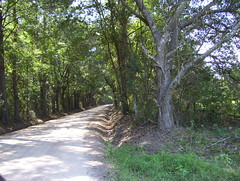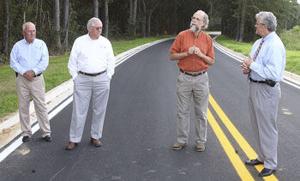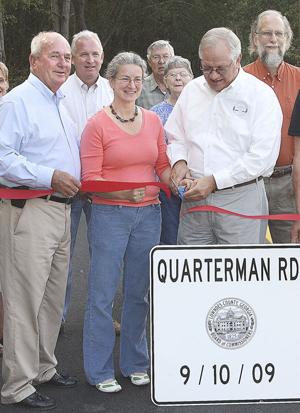I wanted to remember what it was like before it got paved so I took this video.
-gretchen
-gretchen
“from a traffic safety perspective, the modern commercial arterial is a perfect storm of bad planning and design. These roads are designed to support high operating speeds, making it difficult for drivers to stop quickly to avoid a crash, and the presence of commercial and retail uses on these roads means that drivers will routinely need to stop quickly in order to avoid crashing into pedestrians, bicyclists, and especially vehicles turning in and out of driveways.”The 2006 article, Safe Urban Form: Revisiting the Relationship Between Community Design and Traffic Safety, by Eric Dumbaugh and Robert Rae, notes: Continue reading
 Beta New Urban Network reported 1 September 2006 that
Research: trees make streets safer, not deadlier:
Beta New Urban Network reported 1 September 2006 that
Research: trees make streets safer, not deadlier:
Proposals for planting rows of trees along the roads — a traditional technique for shaping pleasing public spaces — are often opposed by transportation engineers, who contend that a wide travel corridor, free of obstacles, is needed to protect the lives of errant motorists.The study asks a key question: Continue readingIncreasingly, however, the engineers’ beliefs about safety are being subjected to empirical study and are being found incorrect. Eric Dumbaugh, an assistant professor of transportation at Texas A&M, threw down the gauntlet with a long, carefully argued article, ”Safe Streets, Livable Streets,” in the Summer 2005 issue of the Journal of the American Planning Association. A follow-up article by Dumbaugh, in the 2006 edition of Transportation Research Record, will present further evidence that safe urban roadsides are not what the traffic-engineering establishment thinks they are.
Though engineers generally assert that wide clear areas safeguard motorists who run off the roads, Dumbaugh looked at accident records and found that, on the contrary, wide-open corridors encourage motorists to speed, bringing on more crashes. By contrast, tree-lined roadways cause motorists to slow down and drive more carefully, Dumbaugh says.
Dumbaugh examined crash statistics and found that tree-lined streets experience fewer accidents than do “forgiving roadsides” — those that have been kept free of large, inflexible objects. He points to “a growing body of evidence suggesting that the inclusion of trees and other streetscape features in the roadside environment may actually reduce crashes and injuries on urban roadways.”
 We haven’t done one of these in a while: a video drive-through
of a canopy road of south Georgia.
This one is Beatty Mill Creek Road in northeast
Lowndes County. So far northeast its mailing address is Ray City.
It’s not all canopy, but there are a number of stretches of it.
We haven’t done one of these in a while: a video drive-through
of a canopy road of south Georgia.
This one is Beatty Mill Creek Road in northeast
Lowndes County. So far northeast its mailing address is Ray City.
It’s not all canopy, but there are a number of stretches of it.
Video by John S. Quarterman, 7 June 2010.
A canopy road, in Georgia, with no curbs or gutters. Sure, it doesn’t go anywhere. Neither does Quarterman Road.
Thanks to Bob Clouston for the pointer.
 The Valdosta Daily Times caught me working on being tactful.
The Valdosta Daily Times caught me working on being tactful.
Matt Flumerfelt’s writeup actually conflates two different county commission meetings, but gets the gist right:
The fate of the tree canopies lining the rural road were thought to hang in the balance. Several residents spoke in favor of the paving, citing dangerous conditions along the road during periods of stormy weather.Oh, the beaver will be mad. I forgot to mention the beaver.John and Gretchen Quarterman, whose ancestors lent their name to the country lane, led the fight to preserve the road in its original pristine dirt-road condition.
The forest along Quarterman Road is “a scrap of the longleaf fire forest that used to grow from southern Virginia to eastern Texas,” said John Quarterman following the ribbon-cutting ceremony. “This forest has been here since the last ice age.”
Quarterman Road, pre-paving, was the kind of dirt road down which Huckleberry Finn might be envisioned skipping barefoot with a fishing rod projecting over one shoulder.
It was the kind of road near which Thoreau might have planted a cabin.
“Many people don’t know that a longleaf pine forest has more species diversity than anything outside a tropical rain forest,” Quarterman said. “In our woods, we have five species of blueberries, …
 The rest of the story is on the VDT web pages.
More pictures of the event in the previous blog entry.
The rest of the story is on the VDT web pages.
More pictures of the event in the previous blog entry.
For pictures of what lives in the forest, see longleaf burning gopher tortoises, snakes, frogs, bees and butterflies, spiders and scorpion, and raccoon, and beautyberry, pokeberry, passion flower, pond lily, ginger lily, Treat’s rain lily (native only to south Georgia, north Florida, and a bit of Alabama), thistle, sycamore, palmetto, mushrooms, lantana, magnolia, grapes, yellow jessamine, dogwood, and native wild azaleas.
The VDT has a good picture of Gretchen cutting the ribbon.
But it’s not over just because one road project is completed:
“More people around the county seem to be paying attention these days. Commissioners tell us that already another road in the county has had its canopy saved during paving, and the commission has promised residents of Coppage Road that if their road is paved, their canopy will be saved. Commissioners even seem to like the idea of recognizing canopy roads as a feature of quality of life for residents of the county and for visitors.”
We have a forest. The county just has roads.
Now let’s go see what they’re doing to the rest of our roads. And schools, and waste management, and biofuels, and industry…. If you’d like to help, please contact the Lowndes Area Knowledge Exchange.
Before that, the crowd assembling: Continue reading
The ribbon cutting is 10AM tomorrow, Thursday, 10 September 2009, at the north end of the north canopy. If you like trees, come see the ones we’ve got left.
From Hahira go east on 122, right on Hambrick Road, right on Quarterman Road, pass the subdivision and the fields, and you’ll see people.